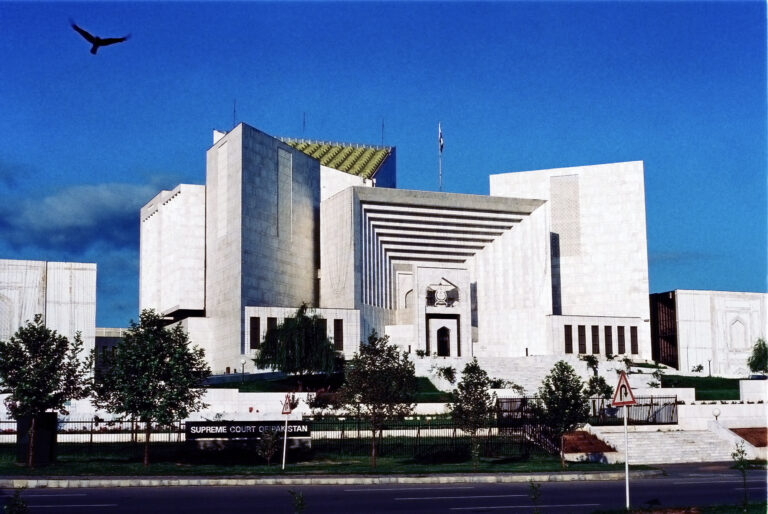Pakistani law students and law graduates inform JURIST about the national events affecting the country’s legal system. Abu Bakar Khan is a final year law student at the Faculty of Law, University of the Punjab. He sends this correspondent report from Lahore.
All eyes are now on Pakistan’s Supreme Court to decide who gets the reserved seats, a decision that will be crucial in determining the direction of governance and possible constitutional reform. The Supreme Court on Tuesday reserved its verdict on the Sunni Ittehad Council’s (SIC) appeal against a Peshawar High Court (PHC) ruling upholding the Election Commission of Pakistan’s (ECP) decision not to grant reserved seats.
The Pakistan Tehreek-e-Insaf (PTI) troubles began when the Election Commission of Pakistan (ECP) revoked its cricket bat symbol on December 22, 2023 for failing to conduct the party’s internal elections in accordance with the constitution. Despite the 2017 Election Act only providing for fines for such violations (Article 208(5)), the ECP treated the PTI as if it had ceased to exist as a political party. The decision was initially overturned by the Peshawar High Court but was reinstated by the Supreme Court on January 13, 2024. This move, which appears to prioritise internal party procedures over general elections, not only forced PTI candidates to run as independents in the February 8, 2024 elections but also raised significant constitutional and procedural concerns about the electoral process.
After the elections, the PTI-backed independents joined the Sunni Ittehad Council (SIC), a registered political party, and demanded reserved seats. However, the Election Commission of Pakistan (ECP) allowed the PTI-backed independents to join the SIC, and then rejected the SIC’s request for allocation of 70 reserved seats in the National Assembly and 156 reserved seats in the Provincial Assemblies. The ECP cited the SIC’s failure to contest the elections and to submit its candidate list for the reserved seats within the stipulated time period. Instead, the ECP reallocated these seats to other parliamentary parties, particularly in favor of the PML-N and the PPP.
The rationale for reserved seats is to ensure representation in parliament for under-represented groups such as women and minorities, as mandated by Article 51(6)(d) and (e) of the Constitution. The Constitution provides that political parties should receive reserved seats through a proportional representation system based on the total number of seats they win in the general election. A proviso to Article 51 provides that the total seats won by a political party shall include independent candidates who join the party within three days. In principle, it would be undemocratic for a political party to receive more or less reserved seats than its proportional share of the total seats.
The allocation of reserved seats has been a major source of controversy, especially in the Khyber Pakhtunkhwa provincial assembly, where PTI-backed independent candidates won 91 seats compared to 19 for all other parties combined. Nevertheless, the JUI-F, which has only seven general seats, won 10 reserved seats for women. Similarly, the PML-N, which had six general seats, won eight reserved seats, while the PPP, which won four general seats, now has six reserved seats.
Fundamental to our democratic principles is the belief that decisions of Parliament and state legislatures must reflect the will of the people, as enshrined in our Constitution. Upholding this ensures fair representation and electoral balance, determined through the right to vote. Upsetting this balance could result in elections in which people have no say and could undermine the electoral outcome. Maintaining the integrity of proportional representation is crucial to upholding our democratic principles and ensuring that the composition of Parliament accurately reflects the choice of voters.
The live coverage of the nine hearings of the 13-member bench was very interesting and also stirred up certain controversies regarding the bench, especially with the precedent of the Balochistan Awami Party (BAP) reserving seats for women in the KP Assembly despite it neither contesting nor submitting a list of candidates in KP before the 2018 general elections. During the hearing, Justice Minara said it was clear that political parties had been excluded due to a wrong interpretation of constitutional provisions and the Supreme Court’s ruling of January 13. He added that this would be a potential endorsement of constitutional violations disguised as necessity.
As the Supreme Court considers the case, it must consider the broader implications beyond mere seat allocation. Despite setbacks such as jailed leaders and bans on candidates campaigning, PTI-backed independents won 92 seats, the most in Pakistan’s directly elected parliament. The Supreme Court must look at the entire issue and not narrow its focus.
The Chief Justice of Pakistan should clearly dispel rumours of bias against the PTI and make it clear that he is not seeking personal gain through the allocation of seats to the coalition government. It is now imperative that the Supreme Court adheres to the rule of law and democratic principles enshrined in the Constitution. The court must ensure that it is not manipulated by unconstitutional forces who seek to bend the outcome to their will. History will judge these decisions impartially and with scrutiny. And history is an unforgiving judge.
Opinions expressed in JURIST Dispatches are solely those of our field correspondents and do not necessarily reflect the views of JURIST editors, staff, or donors, or the University of Pittsburgh.

